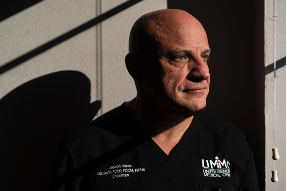The Effect of Thiamine Supplementation for Critically Septic Patient: An Evidence-Based Case Report
Abstract
Sepsis has been accounted for various burdens worldwide, especially in critically ill patients. This could eventually lead to inflammatory response, provocation ischemia and lactic acidosis. On the other hand, thiamine was suggested as a coenzyme which could improve the outcome of those patients. Thus, we conducted an evidence-based case study with research on PubMed, ProQuest, and Scopus using a search strategy focusing on RCT or cohort study on thiamine supplementation/level towards the outcome of critically ill patients with sepsis. We found three articles eligible for review after full-text assessment. Articles were appraised using the University of Oxford’s tools for critical appraisal. It was known that all studies were good in terms of validity and applicability. This study showed that thiamine supplementation could improve lactate clearance and reduce mortality risk, moreover, thiamine deficiency could increase the risk of lactate acidosis. However, a high level of thiamine was associated with a high level of lactate in patients with liver failure. Therefore, thiamine supplementation could be recommended for critically ill patients with sepsis and normal liver function. Further research, such as RCT or systematic review on thiamine supplementation for age groups to make this study more applicable.Downloads
References
Gotts JE, Matthay MA. Sepsis: Pathophysiology and clinical management. BMJ. 2016; 353: i1585.
Sepsis [Internet]. World Health Organization. 2020 August 26 [Cited on 2020 September 26]. Available from: https://www.who.int/news-room/fact-sheets/detail/sepsis#:~:text=In%202017%2C%20the%20largest%20contributors,million%20annually)%20(1
Nee PA. Critical care in the emergency department: Severe sepsis and septic shock. Emerg Med J. 2006 Sep; 23(9): 713–7.
Mira JC, Gentile LF, Mathias BJ, Efron PA, Brakenridge SC, Mohr AM, et al. Sepsis pathophysiology, chronic critical illness, and PICS. Crit Care Med. 2018 Feb 1; 45(2): 253–62.
Chaitanya KV, Gopavajhula VR, Beebi SK. Role of thiamine in human metabolism: A review. J of Pharm Res. 2012; 5(11): 5144–8.
Attaluri P, Castillo A, Edriss H, Nugent K. Thiamine deficiency: An important consideration in critically ill patients. The Am J of the Med Sci. 2018 June; 356(4).
De Andrade JA, Gayer CR, Nogueira NP, Paes MC, Bastos VL, Neto JC, et al. The effect of thiamine deficiency on inflammation, oxidative stress, and cellular migration in an experimental model of sepsis. J Inflamm (Lond). 2014; 11: 11.
Critical appraisal tools [Internet]. Center for Evidence-Based Medicine University of Oxford. Undated [Cited on 2020 September 26]. Available from: https://www.cebm.ox.ac.uk/resources/ebm-tools/critical-appraisal-tools
Oxford center for evidence-based medicine: Level of evidence [Internet]. Center for Evidence-Based Medicine University of Oxford. 2009 [Cited on 2020 September 26]. Available from: https://www.cebm.ox.ac.uk/resources/levels-of-evidence/oxford-centre-for-evidence-based-medicine-levels-of-evidence-march-2009
Byerly S, Parreco JP, Soe-Lin H, Parks JJ, lee EE, Shanydman I, et al. Vitamin C and thiamine are associated with lower mortality in sepsis. J Trauma Acute Care Sutd. 2020 Jul; 89(1): 111–7.
Donnino MW, Carney E, Cocchi MN, Barbash I, Chase M, Joyce N, et al. Thiamine deficiency in critically ill patients with sepsis. J Crit Care. 2010 Dec; 25(4): 576–81.
Woolum JA, Abner EL, Kelly A, Bastin ML, Morris PE, Flannery AH. Effect of thiamine administration on lactate clearance and mortality in patients with septic shock. Crit Care Med.2018 Nov; 46(11): 1747–52.
Jacobi J. Pathophysiology of sepsis. Am J Health Syst Pharm. 2002 Feb 15; 59: 3–8.
Rabasa C, Dickson SL. Impact of stress on metabolism and energy balance. Current Opinion in Behavioral Sciences. 2016; 9: 71–7.
Wernerman J, Christopher KB, Annane D, Casaer MP, Coopersmith CM, Deane AM, et al. Metabolic support in the ritically ill: a consensus of 19. Critical Care. 2019; 23: 318.
Bedreag OH, Rogobete AF, Sandesc D, Cradigati CA, Sarandan M, Popovici SE, et al. Modulation of the redox expression and inflammation response in the critically ill polytrauma patient with thoracic injury: Statistical correlations between antioxidant therapy. Clin Lab. 2016 Sep 1; 62(9): 1747–59.
Yoo J, Kim RB, Ju S, Lee SJ, Cho YJ, Jeong YY, et al. Clinical impact of supplementation of vitamin B1 and C on patients with sepsis-related acute respiratory distress syndrome. Tuberc Repir Dis (Seoul). 2020 Jul; 83(3): 248–54.
Dancy M, Evans G, Gaitonde MK, Macwell JD. Blood thiamine and thiamine phosphate ester concentrations in alcoholic and non-alcoholic liver diseases. Br Med J (Clin Res Ed). 1984; 289(6437): 79–82.
Submitted
World Nutrition Journal provides immediate open access to its content under the Creative Commons Attribution License (CC BY 4.0). This permits unrestricted use, distribution, and reproduction in any medium, provided the original work is properly cited.













